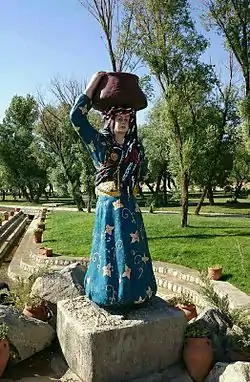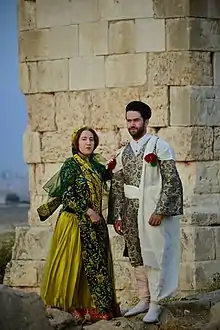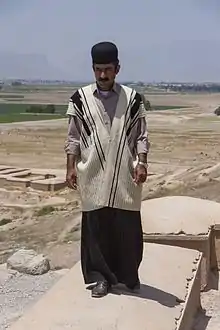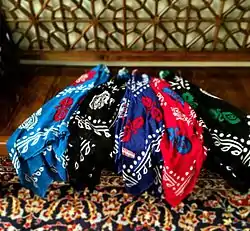Luri clothing
Luri culture has been developed along with the long history of coexistence among Lurs with surrounding natural elements across the Iranian plateau, and geographical, cultural and religious effects.[1][2] This clothing system is a symbol of Luri people although it varies due to geographical and seasonal conditions and between Luri subgroups. The colors of Luri costumes differ by the Lurs location. In a general classification Luri clothes are in two main subgroups: Bakhtiari and Southern Lurs.


Men's clothing
Shaal
Shaal (شال): A long white cloth (width: 60–90 cm, length: 6–9 meters) made by chalvar nature which is twisted all round the waist.
Setra
Setra (سِتره): A special cassock that its size is below the knees and usually is used for more official ceremonies. This clothes is one of the oldest types of clothing in Iran.
Felt hats
Felt hats (کُلأ نِمِدی): A round felt made that has no edges and sometimes is surrounded by Golvani.[3]
Giva
Giva(گیوه): A local handmade shoes with sturdy leather or plastic soles and the vamp is woven by spun yarn.
Chugha

Chugha (چوغا): A masculine wrapper that is used prominently by Bakhtiari Lurs. Chugha is made by sheep wool and usually is woven by Bakhtiari nomads.[4]
Women's clothing
Juma
Juma (جومه) or Kraas(کراس): A free, tall and without a collar dress which is a common clothing of Luri women all across Luristan.
Kolonja
Kolonja (کُلُنجه): is a lacing overcoat which in many cases, the surface is embroidered and decorated by coins.
Saava
Saava (ساوه): A special silk fabric that Lur women tie around the head.
Golvani
Golvani (گُلوَنی): A colorful and patterned type of Saava that mostly is used for celebration and joy. In recent years, Golvani is mentioned as an ethnic symbol of Lurs and every year is celebrated on a certain day (May 16) during spring season.

References
- Asgari Alam, Alimardan (2009), Lurish folk oral literature (illustrated, revised reprint ed.), Aron, Tehran
- Pahlevani, Leila (2013), Documentary of local costumes in Luristan (illustrated, revised reprint ed.), Luristan cultural heritage, handicrafts and tourism administration, KhorramAbad
- Ziapour, Jalil (1967), Clothing of tribes, nomads and villagers in Iran (illustrated, revised reprint ed.), Aron, Tehran
- Oberling, Pierre. "CLOTHING xxv. Clothing of the Baḵtīārīs and other Lori speaking tribes – Encyclopaedia Iranica". www.iranicaonline.org. Encyclopedia Iranica. Retrieved 22 January 2017.
